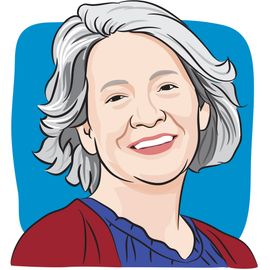- About Us
- Advertise / Support
- Editorial Board
- Contact Us
- CancerNetwork.com
- TargetedOnc.com
- OncLive.com
- OncNursingNews.com
- Terms & Conditions
- Privacy
- Do Not Sell My Information
- Washington My Health My Data
© 2025 MJH Life Sciences™ and CURE - Oncology & Cancer News for Patients & Caregivers. All rights reserved.
Strangers, Manners and a Personal Side of Breast Cancer

Doris Cardwell received a life-changing diagnosis of inflammatory breast cancer in 2007. While undergoing treatment, she co-founded a mentor program for the cancer center treating her. She also created community events to educate, encourage and empower people regarding cancer. Doris was the first Survivorship Community Outreach Liaison for her local cancer center. She is an advocate, educator and encourager on issues facing cancer survivors. Doris is a wife, mother, empty nester, survivor of life and lover of all things coffee. An avid speaker and blogger, she is available at www.justdoris.com.
I am still struggling to navigate the intrusive questions of well-meaning strangers 17 years after surviving inflammatory breast cancer.
Becoming a woman with only one breast is not something I had ever planned for or thought about. Even though it has been my reality for the last 17 years, I still try not to think about it.
I avoid thinking about it because doing so might open doors I'd rather keep closed. I keep a list on my desk of things I can and cannot control. Having had breast cancer falls into the category of what I could not control.
I had inflammatory breast cancer. In 2007, the standard of care was not to undergo reconstruction for at least five years. I decided that if I made it to the five-year mark in good health, I wouldn’t want to have another surgery. By that point, I would have endured chemotherapy, radiation and two surgeries. The surgeries included a mastectomy and a preventative hysterectomy (surgical removal of the uterus).
So, 12 years ago, when I reached that five-year milestone in good health, I chose not to reconstruct. This was a very personal decision. The reasons for reconstructing or not reconstructing are different for every woman. I don’t judge any woman for the choice she makes in this regard. Each of us is different and should feel free to choose the path that feels right for our own situation.
I bring this up because, unfortunately, people don’t always have good manners. I know they don’t mean to be rude, but as I’ve said, this is a deeply personal choice. It’s not a topic for discussion in the checkout line at the grocery store or while waiting at the bank.
Because I often wear a compression sleeve, people frequently ask what I did to my arm. I usually say that I had lymph nodes removed. Most people then ask why, so I tell them I had cancer. Then they often want to know what kind. A few kind souls will ask if I’m healthy now and leave it at that. Others don’t consider how I might feel about further questions.
What is it about having breast cancer that makes total strangers ask whether doctors "took off" my breast? What makes them ask if I chose to reconstruct? And why do so many feel compelled to tell me about their aunt, friend or cousin who died from it? I know I could shut down the conversation by saying, "That’s none of your business," but that’s hard for me. I’m a people person, and I don’t like making others uncomfortable.
Recently, someone asked me what cancer took away from me. I took a deep breath and explained that cancer didn’t just change my life. Cancer altered the trajectory of my entire family’s life. Breast cancer took body parts and more, but it also brought some positives. I am more compassionate and patient now. And that’s a good thing. Because without those qualities, I wouldn’t respond kindly to people who ask intrusive questions. I might ask them if their manners had been removed.
I may never get used to the fact that strangers feel comfortable inquiring about the status of my breast. But I choose to continue educating people on what it’s like to be a breast cancer survivor. I also try to watch my own conversations with strangers to be sure I am not doing the same.
For more news on cancer updates, research and education, don’t forget to subscribe to CURE®’s newsletters here.
Related Content:



